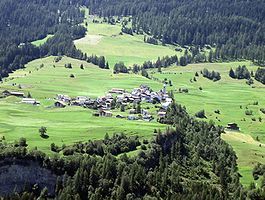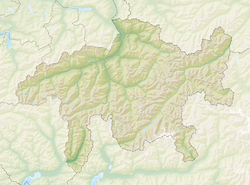Stierva
Stierva | |
|---|---|
 | |
| Coordinates: 46°39′N 9°32′E / 46.650°N 9.533°E | |
| Country | Switzerland |
| Canton | Graubünden |
| District | Albula |
| Area | |
• Total | 10.56 km2 (4.08 sq mi) |
| Elevation | 1,375 m (4,511 ft) |
| Population (2006) | |
• Total | 137 |
| • Density | 13/km2 (34/sq mi) |
| Time zone | UTC+01:00 (Central European Time) |
| • Summer (DST) | UTC+02:00 (Central European Summer Time) |
| Postal code(s) | 7459 |
| SFOS number | 3504 |
| ISO 3166 code | CH-GR |
| Surrounded by | Alvaschein, Mon, Mutten, Salouf, Tiefencastel, Vaz/Obervaz, Zillis-Reischen |
| Website | www SFSO statistics |
Stierva is a former municipality in the district of Albula in the canton of Graubünden in Switzerland. On 1 January 2015 the former municipalities of Alvaschein, Mon, Stierva, Tiefencastel, Alvaneu, Brienz/Brinzauls and Surava merged to form the new municipality of Albula/Alvra.[1]
In the 2000 census, some two-thirds of the population declared Romansh as a first language, with most of the rest speaking German.
History
[edit]Stierva is first mentioned in 841 Seturiuo.[2] Until 1943 Stierva was known as Stürvis.[1]
Geography
[edit]
Before the merger, Stierva had a total area of 10.5 km2 (4.1 sq mi).[3] Of this area, 49.3% is used for agricultural purposes, while 42.1% is forested. Of the rest of the land, 1.8% is settled (buildings or roads) and the remainder (6.7%) is non-productive (rivers, glaciers or mountains).[3]
The municipality is located in the Alvaschein sub-district of the Albula district. It is a haufendorf (an irregular, unplanned and quite closely packed village, built around a central square) above the lower Albula valley.
Demographics
[edit]Stierva had a population (as of 2013) of 134.[3] As of 2008[update], 1.5% of the population was made up of foreign nationals. Over the last 10 years the population has decreased at a rate of -5.8%. Most of the population (as of 2000[update]) speaks Rhaeto-Romance (66.4%), with German being second most common (32.8%) and Italian being third ( 0.8%).[3]
As of 2000[update], the gender distribution of the population was 46.6% male and 53.4% female.[4] The age distribution, as of 2000[update], in Stierva is; 20 people or 15.6% of the population are between 0 and 9 years old. 6 people or 4.7% are 10 to 14, and people or 0.0% are 15 to 19. Of the adult population, 17 people or 13.3% of the population are between 20 and 29 years old. 21 people or 16.4% are 30 to 39, 15 people or 11.7% are 40 to 49, and 12 people or 9.4% are 50 to 59. The senior population distribution is 13 people or 10.2% of the population are between 60 and 69 years old, 16 people or 12.5% are 70 to 79, there are 7 people or 5.5% who are 80 to 89, and there is 1 person or 0.8% who are 90 to 99.[5]
In the 2007 federal election the most popular party was the CVP which received 45.2% of the vote. The next three most popular parties were the SVP (40.6%), the SPS (7.8%) and the FDP (5.9%).[3]
In Stierva about 66.7% of the population (between age 25-64) have completed either non-mandatory upper secondary education or additional higher education (either university or a Fachhochschule).[3]
Stierva has an unemployment rate of 0%. As of 2005[update], there were 21 people employed in the primary economic sector and about 11 businesses involved in this sector. 6 people are employed in the secondary sector and there are 2 businesses in this sector. 7 people are employed in the tertiary sector, with 4 businesses in this sector.[3]
The historical population is given in the following table:[2][4]
| year | population |
|---|---|
| 1850 | 179 |
| 1900 | 150 |
| 1950 | 150 |
| 1960 | 130 |
| 1970 | 114 |
| 1980 | 113 |
| 1990 | 100 |
| 2000 | 137 |
| 2010 | 140 |
References
[edit]- ^ a b Amtliches Gemeindeverzeichnis der Schweiz published by the Swiss Federal Statistical Office (in German) accessed 2 January 2013
- ^ a b Stierva in German, French and Italian in the online Historical Dictionary of Switzerland.
- ^ a b c d e f g Swiss Federal Statistical Office accessed 15 January 2015
- ^ a b Graubunden in Numbers Archived September 24, 2009, at the Wayback Machine (in German) accessed 21 September 2009
- ^ Graubunden Population Statistics Archived August 27, 2009, at the Wayback Machine (in German) accessed 21 September 2009
External links
[edit]- Official website (in German)
- Stierva in German, French and Italian in the online Historical Dictionary of Switzerland.




